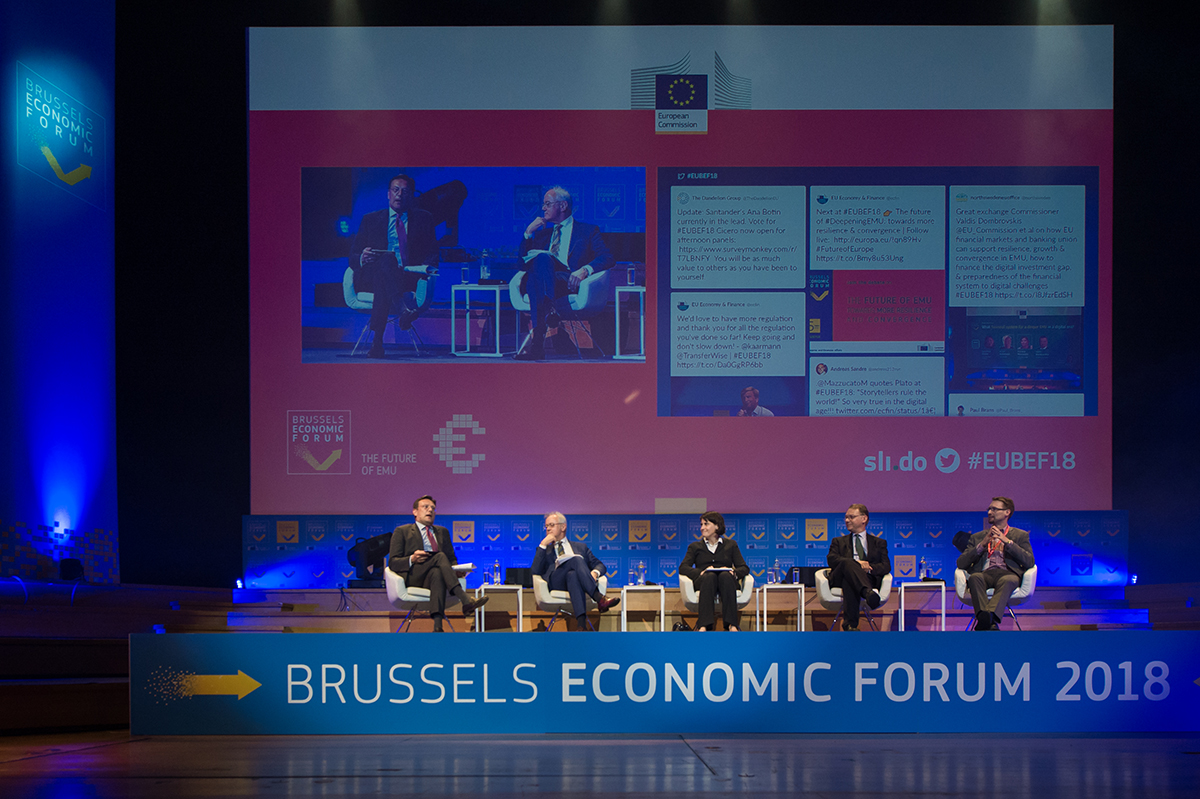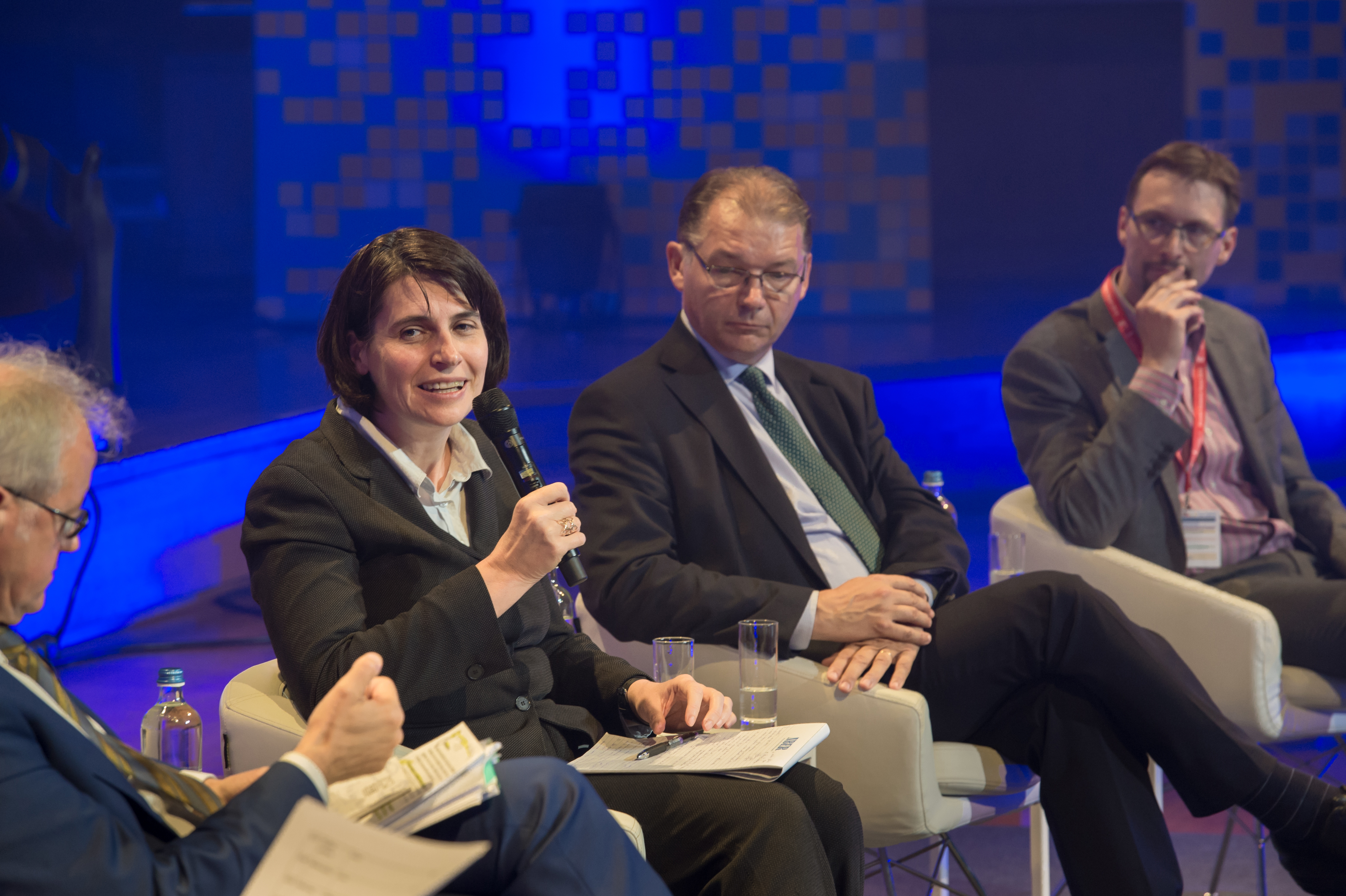Common narrative needed on future of Economic and Monetary Union
The European Union needs to agree a common diagnosis and narrative on the road towards completing its Economic and Monetary Union, Marco Buti, Director-General for Economic and Financial Affairs at the European Commission told the 18th Brussels Economic Forum.
This should be accompanied by “very concrete steps”, such as a backstop, or safety net, played by the European Stability Mechanism (ESM), he said. It would come into play if the Single Resolution Fund temporarily runs out of resources to achieve the orderly resolution of distressed banks. Agreed in principle five years ago, the backstop has not yet become reality.
Mr Buti, standing in for Commissioner Pierre Moscovici, set out the Commission’s priorities in a panel discussion on The future of EMU: towards more resilience and convergence. They came just days after Chancellor Angela Merkel had outlined Germany’s position on the way ahead and weeks before EU leaders discuss the issue at their June summit in Brussels.
“We still do not have a fully shared narrative,” Mr Buti said, “but the fact that we are talking and agree we have to go forward to complete the architecture is already an achievement.”
In addition to strengthening the ESM, he called for progress on agreeing a common deposit insurance scheme and completion of a capital markets union. The latter is essential to provide the investment needed for the digital revolution and to allow excess savings in one part of the euro area to be reallocated elsewhere.

Hélène Rey (Professor of Economics, London Business School) warned that the need for concrete steps was more urgent than many people appreciated. The interaction of the financial crisis, austerity policies and large scale migration had created shocks in the system and was fuelling political extremism – just as the 1929 Great Crash had done.
Philippe Lamberts MEP, Co-chair of the Greens/EFA group in the European Parliament, was equally critical of the lack of urgency. “How come 10 years after the financial crisis we do not have a functioning system in Europe?” he asked. Action would only come, he suggested, with the threat of a major crisis involving some euro area members. Populism was also on the rise in Belgium, traditionally a strongly pro-European country, he warned.
Martin Sandbu, a columnist at the Financial Times, noted that the traditional EU response to any problem is to consider institutional reform. That he argued was not necessary. What was needed was to use fully existing tools and powers, he said. Sandbu singled out a pan-European deposit insurance scheme as an essential key for the EMU and urged the EU to adopt ambitious policies for growth and stabilisation. “We should practise our policies better,” he said.
Similarly, Mr Lamberts dismissed the need for treaty change. Instead, he urged the EU to take a hard look at its macroeconomic policies and use these to tackle the inequalities in society and start rebuilding trust in the Union.

Prof Rey agreed with his view that the EU’s fiscal rules need to be reviewed. She suggested they should have more national ownership and flexibility, so “if something goes wrong, there is more accountability”. She also made a case for institutional reform. “I’m not sure agreement on the right policies is enough. Institutions have to be sufficiently robust towards bad policies,” she explained.
Mr Buti pointed out the many changes that have been made to the EU’s fiscal rules since they were introduced. “The old rules were very simple. What we have done since is to try and make it more intelligent, which inevitably means more complex,” he explained. That complexity has been partly driven by a lack of trust between key players, leading to a tendency to codify everything in a highly detailed way.
Mr Lamberts stated that his preference was for simpler rules and more discretion. He acknowledged that there was a massive issue of trust, but rejected the notion that some could be trusted and others not. “We all have issues on trust,” he said.
Mr Sandbu pointed out that the biggest source of distrust in the euro area had been the relationship between debtors and creditors. It had poisoned human relations and was “one of the most noxious consequences of the crisis”.
Mr Buti introduced a further element into the debate: the external developments with which the EU has to deal. “The general global situation should definitely be a push towards a stronger Europe,” he said.
